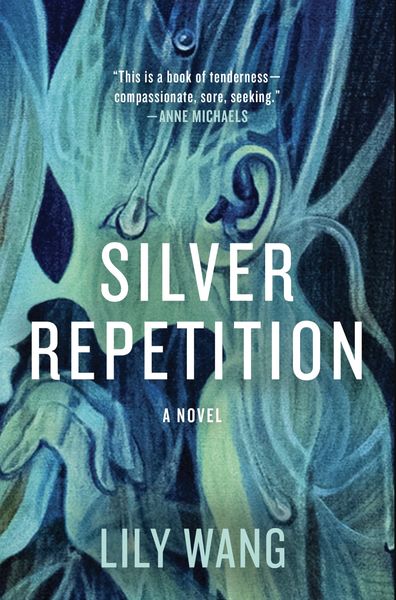Lily Wang Brings the Reader Into the Dream in Silver Repetition
The fact the author Lily Wang studied repetition theory in university will not be lost of readers of their new novel, a unique and mesmerizing work where memory and dream, loss and return, and the trappings of our lives form endless, perfect loops.
In Silver Repetition (House of Anansi Press), Wang tells the story of Yuè Yuè, a university student nearing the end of her degree and navigating a new relationship. As a young girl, she emigrated to Canada from China with her parents, and now finds herself seeking connection with her Canadian-born younger sister, and grieving a lost cousin from her old home, all while her mother suffers from unrelenting illness.
After being ghosted on a date, Yuè Yuè takes a walk in the woods and comes across a young girl digging in the mud. And, when she approaches the girl and looks closer, past a curtain of black hair, it is her own face staring back.
Join us for a fascinating Long Story Novelist Interview, in which the author shares some insight into their unique writing style and approach to storytelling, and talks about these loops that spin at the heart of the story, illuminating the fullness of identity despite fractures in language, culture, and relationships.
Open Book:
Do you remember how you first started this novel or the very first bit of writing you did for it?
Lily Wang:
At the time I started the book, there was a short story that gained a lot of attention. Very contemporary and very young, very much about dating and how dating is ugly but ugly in the way that makes beautiful writing. It annoyed me very much. I would say a lot of my writing is reactive. I wanted to begin my book in that categorical way, with young people, at a bar, on a date, in the city, I even mimic the style of writing.
In my story there is no stereotyped ‘city-girl-at-bar-on-date’. There is only perhaps a girl you vaguely know, and maybe you’re even friends with her, maybe she’s even been to your house and sat on your couch, but do you really know her? What’s inside of her? I want to show you her dreams.
The style changes too. It gets weirder and weirder. It’s your dream now.
Your CanLit News
Subscribe to Open Book’s newsletter to get local book events, literary content, writing tips, and more in your inbox
OB:
Did the ending of your novel change at all through your drafts? If so, how?
LW:
I remember being gently nudged by my editor, Shirarose Wilensky (she’s amazing), about the ending. She was like, There… isn’t an ending? And I was like, You’re right…
There were a lot of loose strings I needed to tie into loops, and I was going around making these little knots here and there and avoiding giving the book an ending. I wanted it to keep on living. It had become such a mirror of reality that I didn’t feel like I had the right to offer it an ending. What power do I have? What can I suggest?
Virigina Woolf’s To the Lighthouse played a big influence on my thinking at this time. I mean before the timeskip. You can consider the play-by-play of each character’s fate as an end-of-credits bonus, you can walk out of the theater before it. So in the timeline—let’s call it the brown stocking timeline—the brown stocking timeline, there we are with the stocking and the window and the tomorrow… Why seep us so into this present, this tomorrow… ? And now that we find ourselves here, how can we leave?
Woolf dismantled what I thought I knew about book ‘endings’ and allowed me to think about the beginning, and the book itself as a loop. The looping motion generates the future; generates the present, and of course, it keeps the past alive.
OB:
Did you find yourself having a "favourite" amongst your characters? If so, who was it and why?
LW:
I really like Little Yue Yue, because she is sharp and charming. She’s hurt in the way children hurt, sour like her heart is purple, but she’s very mature too. I find her very endearing.
My favourite character who isn’t a ghost? Emily. I based Emily on one of my sisters. My hope is that she can feel my love for her when she reads about Emily.
OB:
Did you do any specific research for this novel? Tell us a bit about that process.
LW:
I did my Masters at the University of Toronto, on the theory of repetition. I actually have my syllabus (courtesy of Professor Uzoma Esonwanne, who is retired now)—here are my teachers lined up in alphabetical order: Casey, Deleuz, Eliade, Kawin, Kierkegaard, Marx, Miller, Rimmon, Said, and Vico. (I sang the alphabet in my mind.)
Mostly I read about repetition compulsion, which means a lot of Freud and some Lacan. I read Ishiguro’s Pale View of Hills too late and the inspiration haunts me.
The Masters in English at the University of Toronto is a two year program. The first year is dedicated to critical theory, and the second year you are paired with a supervisor for your independent project. As it turned out, I would be writing my book entirely during lockdown. My days of total banal repetition.
Writers play a formidable role in how we understand memory, and dream and memory, and that has to do with the future and with hope, so I wanted to do it properly, especially the psychological horror, I need things to feel on paper the way they do in my mind. Style is reality.
OB:
Did you include an epigraph in your book? If so, how did you choose it and how does it relate to the narrative?
LW:
A line from Søren Kierkegaard’s Repetition and Philosophical Crumbs. The translation I have reads: “I can circumnavigate myself, but I cannot get beyond myself.” I like the breakdown of syllables in ‘circumnavigate’. Cir-cum—the c’s, r, m, rounded, slipping, looping, you speak a semicircle, your (mind) tongue has to nav-i-gate the word, make a semi-circle, circle; so the word alone generates this cyclical motion that is the problem of repetition that Kierkeegard wants us to think about. It’s hypnotizing. You realize you’ve hypnotized yourself. You cannot get beyond yourself.
I played a little trick on you by entangling you at the sentence level, to try to explain something complicated and infinite with a few words. One of the most exciting things about theory lies in the ways it can fail. When K put that glowing ring in my mind, this endless perfect loop, I thought: how does one circumnavigate a fracture?
There are two immediate ways to look at it: trauma that literally fractures the line or loop, and repetition as copy, to copy another. Who does the immigrant repeat? A father who enunciates words after the radio. A mother who begins to cultivate a garden…
The immigrant whose loop is fractured, who has no clear self to copy into self.
A fracture in time like a crystal mirror.
Every time I speak about that quote it reinspires me, re-confuses me. Thank you for re-minding me.
Thank you for this interview!
_____________________________________________________
Lily Wang was born in Shanghai, China, and immigrated to Canada at the age of six. They have an MA in English and creative writing from the University of Toronto. They live in Toronto.





